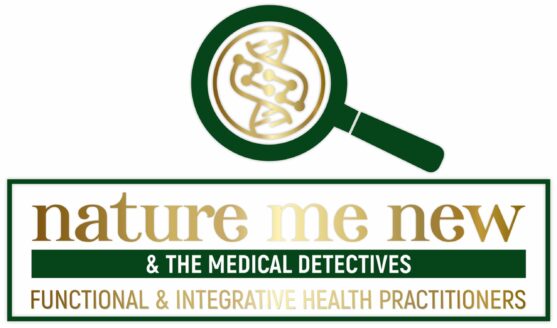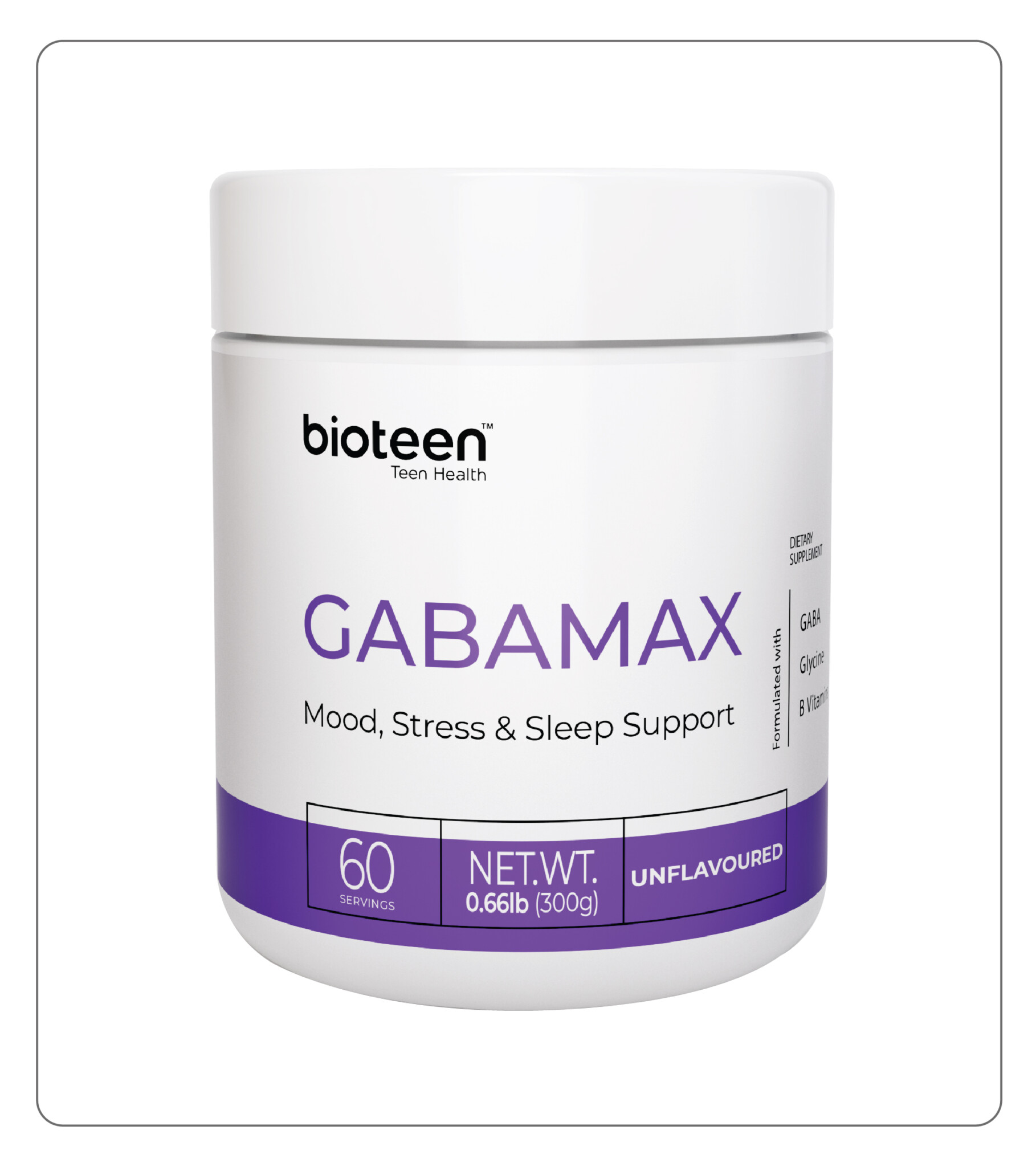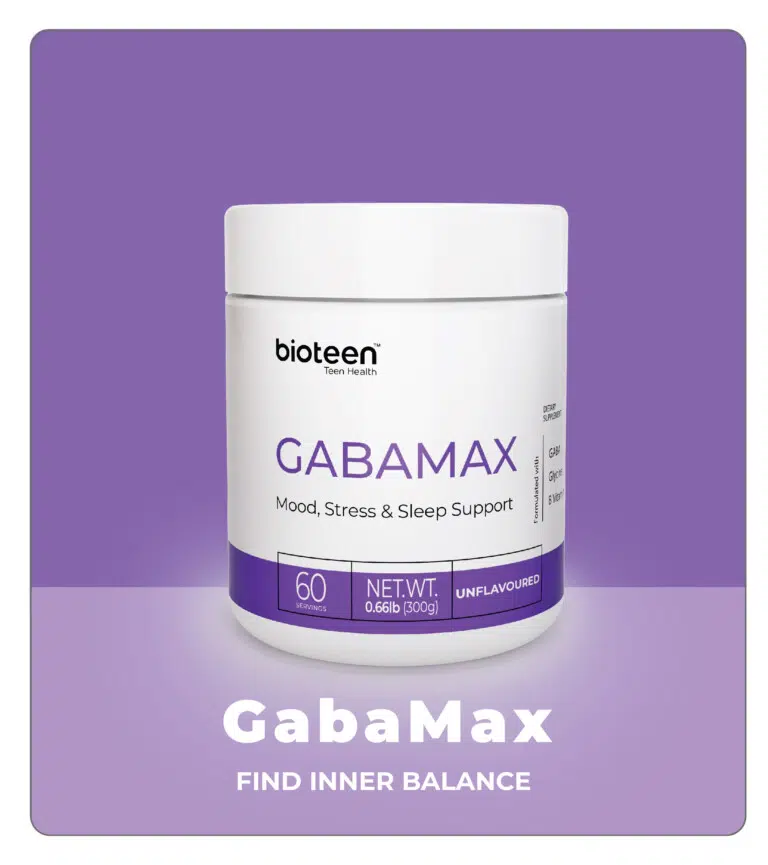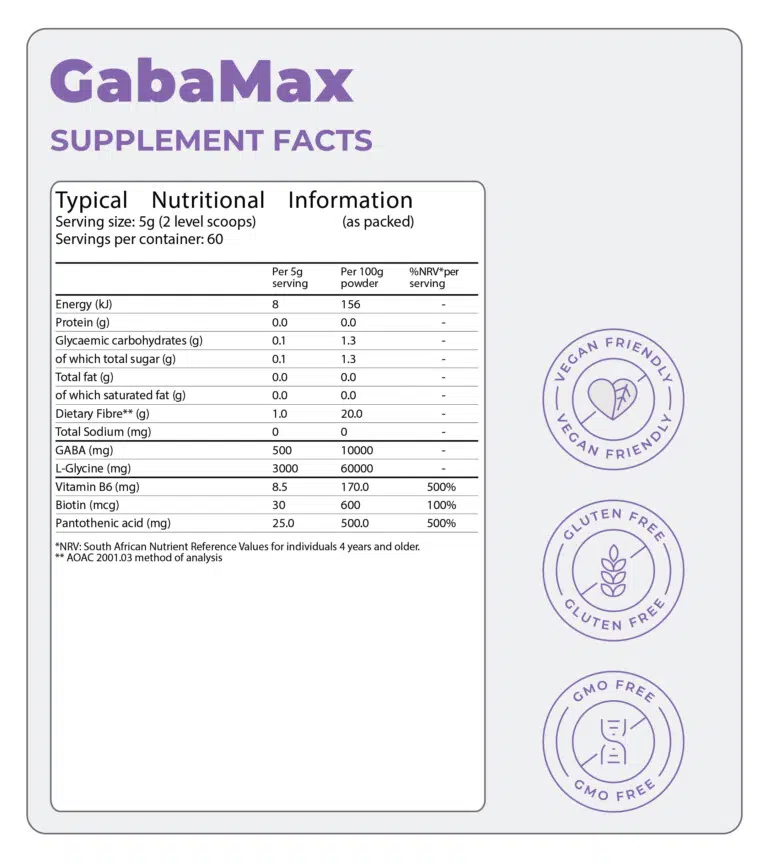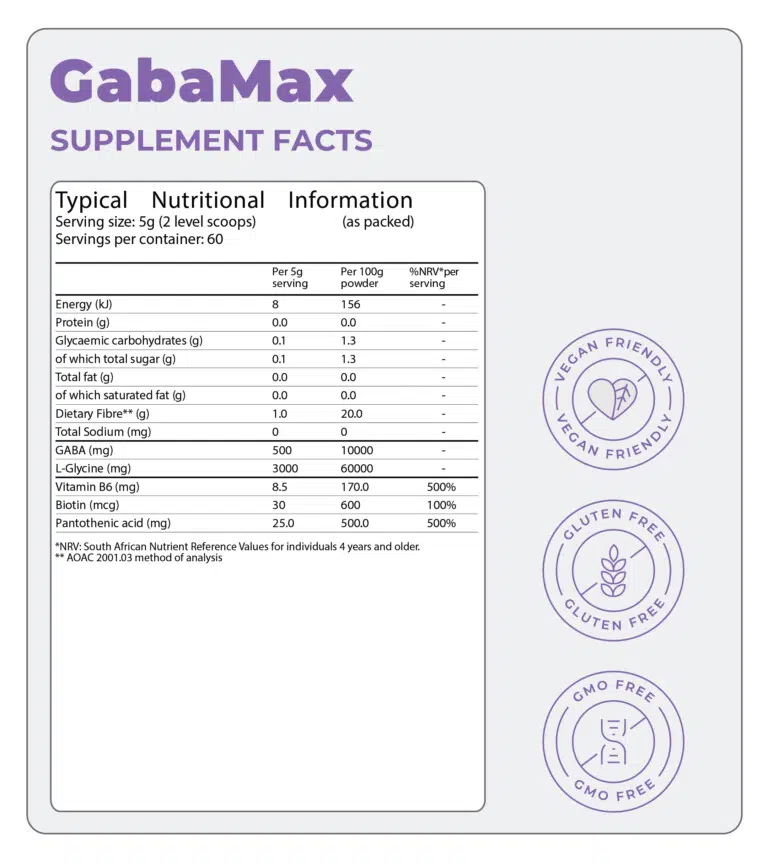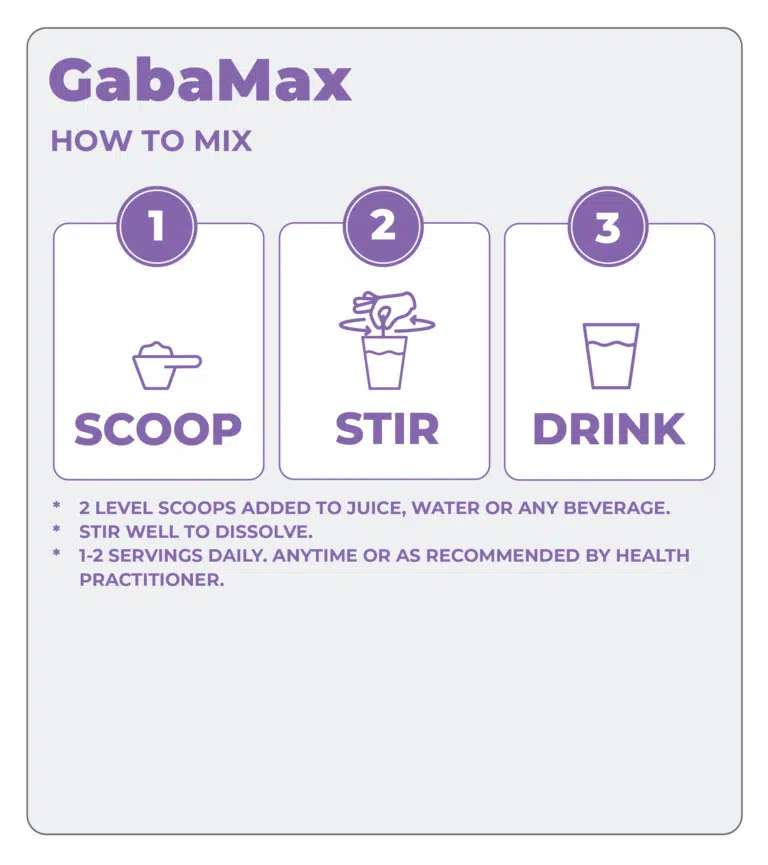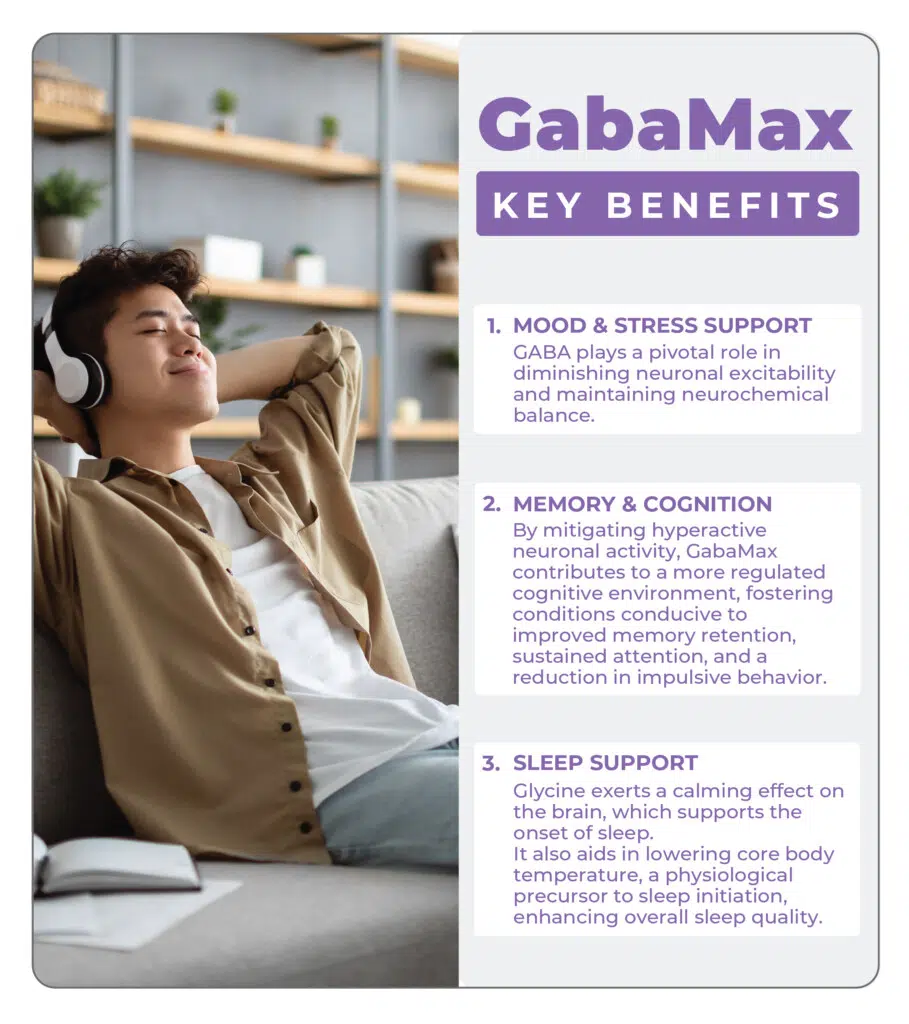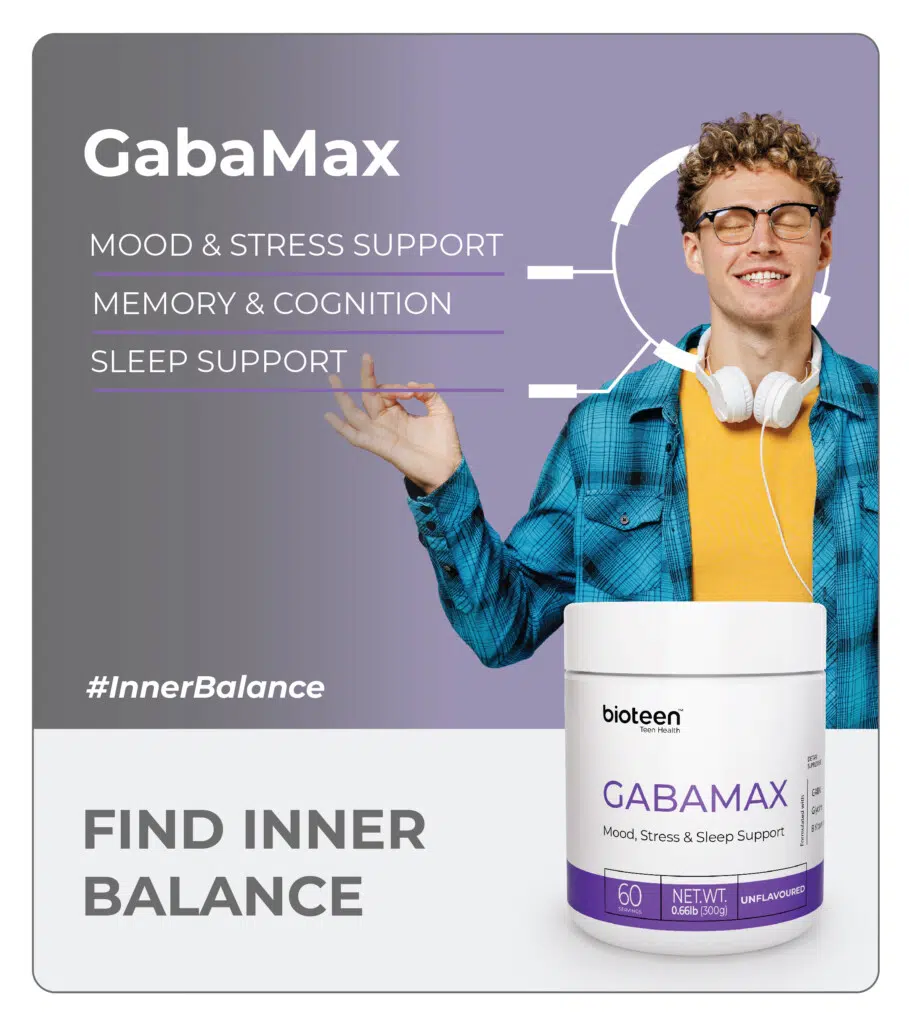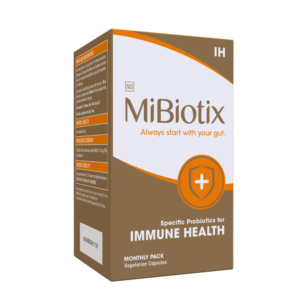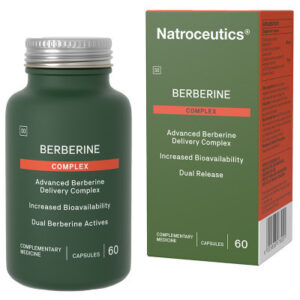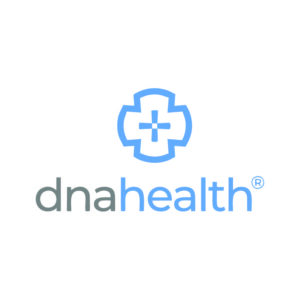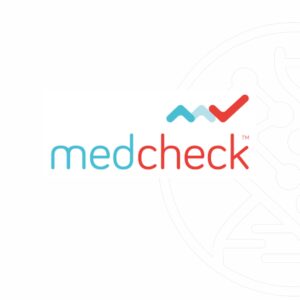Bioteen has what your teen needs to lead a nutritionally complete and balanced life which includes getting enough sleep. We all know that sleep is an important part of that, but unfortunately it doesn’t always come naturally to all teens. The research shows that while teens should be aiming for 9-10 hours of sleep per night, more than 40% are getting less than 8 hours. This loss of sleep can have negative effects on their cognitive, psychological, and even physical health.
Because we know sleep is that important, we’ve created a number of unique solutions to meet every teen’s needs. Including our sleep booster: GABA. Let’s explore how these unique ingredients can help your teen to fall asleep, stay asleep and have a better-quality sleep overall.
- GABA and glycine as inhibitory neurotransmitters
GABA (or gamma-aminobutyric acid) and glycine both belong to a class of chemical called neurotransmitters. These are essentially chemical signaling molecules that the brain uses to communicate with other brain cells (or neurons). After being produced, neurotransmitters activate specific receptors in the brain where they either excite the brain, making you feel more alert and awake (like glutamate), or relax the brain, slowing down its activity and relieving anxious symptoms (like GABA).
If we want to take advantage of the relaxing nature of GABA, we need to increase their levels and one way that we can do this is by taking them orally as a supplement. When you have higher levels of these inhibitory neurotransmitters, your brain activity will slow down more quickly, and you are more likely to feel relaxed. This is the perfect combination to allow you to fall asleep quicker and stay asleep for longer. When this happens, you’ll be getting more sleep and will be more likely to experience all the stages of sleep, including the right amounts of deep sleep (which is the type of sleep you need to make you feel refreshed and awake the following day).
The reality is that many teens can take more than 30 minutes to fall asleep (where the ‘norm’ is between 10-20 minutes) and once they have fallen asleep, especially if they are feeling anxious, they may wake up frequently and find it difficult to fall asleep again (1).
When GABA is taken as an oral supplement, it is quickly absorbed with blood level being the highest after 30 minutes (2), after this it rapidly decreases. It is thought that this is why GABA strongly affects the early stages of sleep and helps people fall asleep more quickly (3) and also why it doesn’t cause drowsiness the next day or impact what we call ‘sleep architecture’, which is the duration of the different sleep stages throughout the night. There are also a variety of prescription drugs that target the same pathway but unlike GABA they inhibit REM sleep or change your sleep architecture. Besides potentially being addictive, taking these kinds of drugs doesn’t always help you feel more refreshed the next day, even though you may perceive that you’re getting more sleep.
- GABA and brain waves
Another way GABA helps to relax you before bed (and help you fall asleep), is by influencing the types of brain waves your brain produces. Generally, alpha brain waves are associated with a passive state of relaxation, whereas beta waves are associated with anxiety. So, you want more alpha and less beta. GABA helps to do this in two ways. Firstly, a small amount of GABA supplements appears to be able to cross the blood brain barrier to have a direct effect on the brain and secondly oral GABA activates GABA receptors in the gut which then communicate with the brain via the gut-brain axis. The effect that GABA has on the brain is to significantly increase alpha brain waves and decrease beta waves (4,5). This means that your teen will feel more relaxed and less anxious before bed, making it easier to fall asleep and stay asleep.
- GABA’s effect on quality of sleep
Falling asleep and staying asleep aside, if you don’t get enough good quality sleep, you’re not going to feel refreshed and ready to take on the next day. Luckily GABA has been found to increase subjective sleep quality (3).
The way that GABA does this is most likely because there are multiple populations of GABAergic neurons that are involved in the regulation of various stages of sleep including deep sleep (or non-rapid eye movement/ non-REM sleep) and lighter REM sleep. So, by increasing GABA levels, sleep is naturally induced and maintained. GABA also helps to reduce anxiety symptoms which may lead to a subjective improvement in sleep quality.
Glycine on the other hand seems to play a role in helping to reduce core body temperature (6). This is important because this decrease in temperature affects all facets of sleep, from falling asleep, to sleep quality and even time spent in different sleep stages (7). This may be one of the reasons why glycine supplementation has been shown to decrease daytime sleepiness (aka improve sleep resilience) when subjects aren’t sleeping well allowing them to feel more refreshed on waking (8).
All in all, both GABA and glycine work on a number of pathways to not only help your teen feel more relaxed at night so that it is easier for them to fall asleep and stay asleep, but they physiologically assist with improving sleep quality without next day sleepiness. This is important, because besides all the beneficial effects of sufficient sleep, your teen has a lot on their plate and if they feel sleepy, they are much less likely to feel up to the task.
At Bioteen, we’re in the business of getting your teen to where they need to be and that means helping them to get a good night sleep using nutraceuticals in the right amounts that are scientifically proven to help.
References
- Hysing M, Pallesen S, Stormark K, Lundervold A, Sivertsen B. Sleep patterns and insomnia among adolescents: a population-based study. Journal of Sleep Research. 2013;22(5):549-556.
- Yamatsu A, Yamashita Y, Pandharipande T, Maru I, Kim M. Effect of oral γ-aminobutyric acid (GABA) administration on sleep and its absorption in humans. Food Science and Biotechnology. 2016;25(2):547-551.
- Byun J, Shin Y, Chung S, Shin W. Safety and Efficacy of Gamma-Aminobutyric Acid from Fermented Rice Germ in Patients with Insomnia Symptoms: A Randomized, Double-Blind Trial. Journal of Clinical Neurology. 2018;14(3):291.
- Rao T, Ozeki M, Juneja L. In Search of a Safe Natural Sleep Aid. Journal of the American College of Nutrition. 2015;34(5):436-447.
- Abdou A, Higashiguchi S, Horie K, Kim M, Hatta H, Yokogoshi H. Relaxation and immunity enhancement effects of γ-Aminobutyric acid (GABA) administration in humans. BioFactors. 2006;26(3):201-208.
- Kawai N, Sakai N, Okuro M, Karakawa S, Tsuneyoshi Y, Kawasaki N et al. The Sleep-Promoting and Hypothermic Effects of Glycine are Mediated by NMDA Receptors in the Suprachiasmatic Nucleus. Neuropsychopharmacology. 2014;40(6):1405-1416.
- Kräuchi K, Fattori E, Giordano A, Falbo M, Iadarola A, Aglì F et al. Sleep on a high heat capacity mattress increases conductive body heat loss and slow wave sleep. Physiology & Behavior. 2018;185:23-30.
- Bannai M, Kawai N, Ono K, Nakahara K, Murakami N. The Effects of Glycine on Subjective Daytime Performance in Partially Sleep-Restricted Healthy Volunteers. Frontiers in Neurology. 2012;3.
